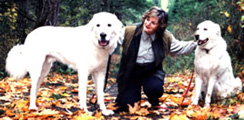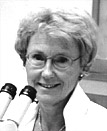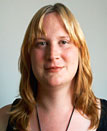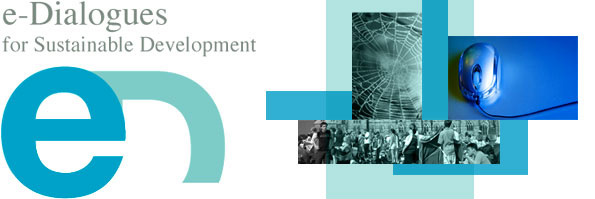Introduction
We are now at a stage in human society where natural and human systems are co-evolving, and their dynamic sustainability (Newman 2005) is interdependent. The continuing decline in ecosystem services shows that communities everywhere need to act now to maintain and enhance these essential services to human life. Human progress may now rely on our ability to deliberatively re-design our communities in new ways (Dale 2001; Dale and Onyx 2005; Cote, Tansey, Dale 2005).
Key to any re-design strategies and ultimately sustainable community development are critical public policy questions about the nature of limits, the meaning of place, issues of scale and diversity. Join Dr. Ann Dale’s Canada Research Chair team as they converse on-line about these four research themes. These dialogues are designed to be informal conversations, brainstorming each of the four research themes and sharing with younger scholars the joys and tensions of interdisciplinary research. Join the on-line audience and pose your own questions to the research team.
Tune in on the third Thursday of every month, starting January 19th, 2006, for vibrant on-line conversations about the meaning of sustainable community development in Canada.
| Part 4: Diversity |
Loss of ecological integrity everywhere means that there is a concomitant loss of biodiversity in communities worldwide. New estimates are that we have lost 10% of the world's forests over the past 10 years; nearly 50% of all fish stocks are fully exploited (Pauley); and by 2025, 15% of all forest species will be extinct (World Resources Institute 2003). Human diversity is also declining; all except 200 of the modern world's 6,000 languages are likely to be extinct or moribound by the end of the next century (Diamond 1993). Diversity of place - physical and non-physical; diversity of space - mental, emotional and spiritual and diversity of life - human and non-human may be one of the most important social imperatives facing communities in this century, as more and more species become endangered and moral decisions have to be made about when or whether to intervene based on limited financial resources. What is the importance of ecological diversity for future economic choices? What are community alternatives and strategies for maintaining critical ecological, economic and social diversity?
(Pauley); and by 2025, 15% of all forest species will be extinct (World Resources Institute 2003). Human diversity is also declining; all except 200 of the modern world's 6,000 languages are likely to be extinct or moribound by the end of the next century (Diamond 1993). Diversity of place - physical and non-physical; diversity of space - mental, emotional and spiritual and diversity of life - human and non-human may be one of the most important social imperatives facing communities in this century, as more and more species become endangered and moral decisions have to be made about when or whether to intervene based on limited financial resources. What is the importance of ecological diversity for future economic choices? What are community alternatives and strategies for maintaining critical ecological, economic and social diversity?
| Part 4: Diversity Panelists |
 Dr. Ann Dale, Trudeau Fellow
Dr. Ann Dale, Trudeau Fellow
Professor, School of Environment and Sustainability, Royal Roads University
Faculty of Social and Applied Sciences
Canada Research Chair on Sustainable Community Development
Dr. Dale is a rare hybrid, both an academic and an activist. Currently she is engaged in two major research initiatives at Royal Roads University. First, she is leading the e-Dialogues for Sustainable Development, a series of online dialogues exploring critical issues using the power of the internet to influence public policy. Second, she is working on exploring the relationship between social capital and sustainable community development. In 2001, she received the Policy Research Initiative's Outstanding Research Contribution Award for her most recent book, At the Edge: Sustainable Development in the 21st Century.
 Dr. Valerie Behan-Pelletier is a Research Scientist in Biodiversity in the Environment Program at Agriculture and Agri-Food Canada. She is an expert on systematics and biodiversity of soil mites in ecosystems globally, and has a broad research interest in biodiversityValerie and ecology of arthropods in soil and canopy habitats. She is currently engaged in major research initiatives on ancient forest canopy biodiversity in British Columbia, on tall-grass prairie soil biodiversity in the USA, and on arthropod biodiversity of tropical rainforest in Costa Rica. Valerie is a recent member of the Scientific Committee of the Biological Survey of Canada. She is a graduate of University College Dublin, Ireland and McGill University, Montreal.
Dr. Valerie Behan-Pelletier is a Research Scientist in Biodiversity in the Environment Program at Agriculture and Agri-Food Canada. She is an expert on systematics and biodiversity of soil mites in ecosystems globally, and has a broad research interest in biodiversityValerie and ecology of arthropods in soil and canopy habitats. She is currently engaged in major research initiatives on ancient forest canopy biodiversity in British Columbia, on tall-grass prairie soil biodiversity in the USA, and on arthropod biodiversity of tropical rainforest in Costa Rica. Valerie is a recent member of the Scientific Committee of the Biological Survey of Canada. She is a graduate of University College Dublin, Ireland and McGill University, Montreal.
 Stephen Huddart is the Program Director of the J.W. McConnell Family Foundation in Montreal. The Foundation's granting derives from a mandate to fund national initiatives thatengage people in building resilient communities – and among others includesprograms in environmental and arts-infused education, technical assistance for community economic development, university-based community service learning and community leadership.
Stephen Huddart is the Program Director of the J.W. McConnell Family Foundation in Montreal. The Foundation's granting derives from a mandate to fund national initiatives thatengage people in building resilient communities – and among others includesprograms in environmental and arts-infused education, technical assistance for community economic development, university-based community service learning and community leadership.
He is married with three children, two cats and a dog, and has a Masters degree in management from McGill University.
 Dr. Lenore Newman is a writer, teacher and researcher living in Ottawa. She grew up in a small coastal community in British Columbia and has a long standing interest in the environment. Lenore has a background in physics, complex systems theory, human geography, social change, and sustainability. Her doctorate is from York university; it examined theoretical aspects of sustainability in rapidly changing societies. Her research interests include sustainability at the community level and sustainable technology including biomimicry, the modeling of technology upon ecological systems.
Dr. Lenore Newman is a writer, teacher and researcher living in Ottawa. She grew up in a small coastal community in British Columbia and has a long standing interest in the environment. Lenore has a background in physics, complex systems theory, human geography, social change, and sustainability. Her doctorate is from York university; it examined theoretical aspects of sustainability in rapidly changing societies. Her research interests include sustainability at the community level and sustainable technology including biomimicry, the modeling of technology upon ecological systems.
Lenore is also interested in virtual communities, ecological effects of globalization, and the politics of gender. When Lenore is not on-line, she is likely outdoors.
 Dr. Levi Waldron is a post-doctoral fellow living in Toronto, Ontario. He grew up in the interior of British Columbia, where he completed grade 7 by a combination of home schooling and a one-room elementary school. He went on to UBC for a B.Sc. in physics, then to the University of Waterloo for a M.Sc. in physics, doing quantum calculations of hydrogen molecular spectra. At this point, his growing interest in and concern for the environment led him to complete a Ph.D. in forestry and environmental studies at the University of Toronto, modeling the leaching of wood preservatives from pressure-treated wood. Levi has many research interests including global warming, transportation, implementing sustainability at the community level, and open-source software and development.
Dr. Levi Waldron is a post-doctoral fellow living in Toronto, Ontario. He grew up in the interior of British Columbia, where he completed grade 7 by a combination of home schooling and a one-room elementary school. He went on to UBC for a B.Sc. in physics, then to the University of Waterloo for a M.Sc. in physics, doing quantum calculations of hydrogen molecular spectra. At this point, his growing interest in and concern for the environment led him to complete a Ph.D. in forestry and environmental studies at the University of Toronto, modeling the leaching of wood preservatives from pressure-treated wood. Levi has many research interests including global warming, transportation, implementing sustainability at the community level, and open-source software and development.
